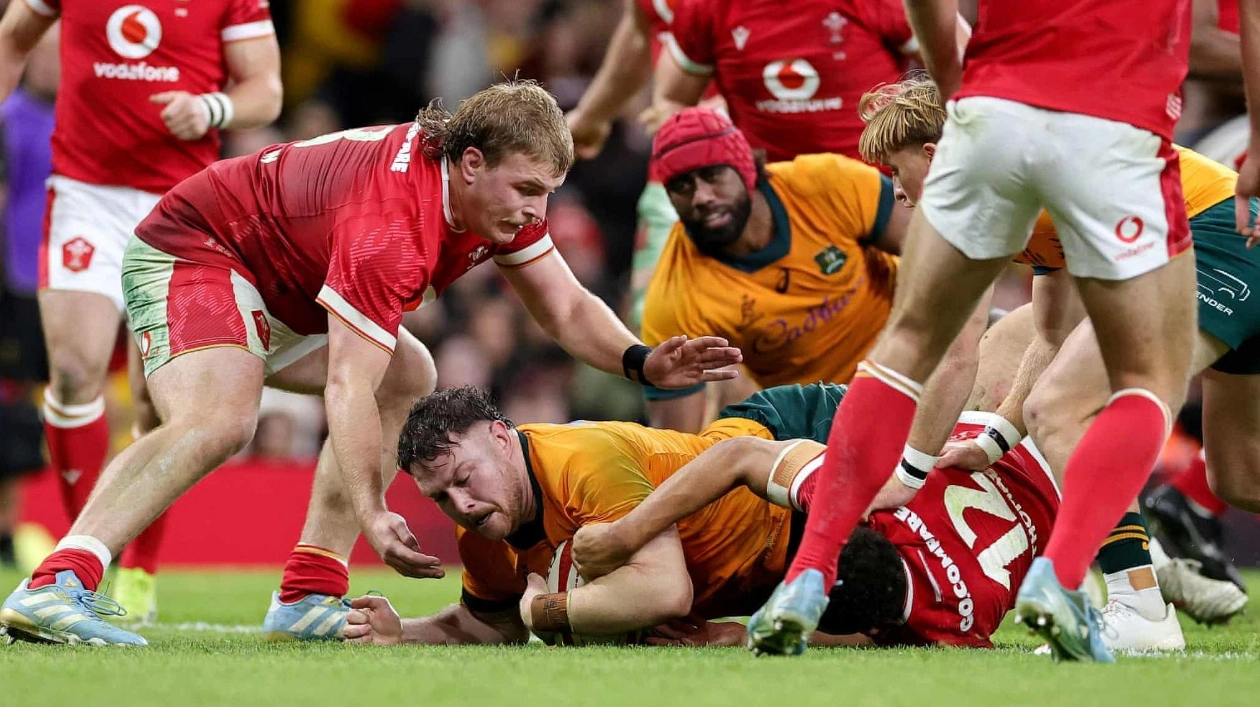In less than two minutes, Australia demonstrated their ongoing development under Joe Schmidt. After securing possession, they swiftly executed a series of plays with Nic White delivering quick, short passes to narrow runners who charged directly and forcefully into contact. This pattern repeated multiple times, culminating in a 13th phase before a ball spill allowed Wales to secure a scrum on their own 22. Although the move did not result in points, it provided a glimpse of the potential under this new leadership.
Last week, Australia achieved a remarkable victory at Twickenham, showcasing true Australian grit. Their lightning-fast hands, precise passes, and agile sidesteps were a testament to their natural talent and the freedom to perform when opportunities arose. However, this flair has always been present. As long as there are 15 players willing to take the field for rugby union, these skills will remain, regardless of the sport's mainstream status. What this team needed was a blend of steel and discipline, patience to complement their flair. This is what wins Test matches.
"We're backing our boring," Schmidt remarked after the London heist. In Cardiff, his team exemplified his words. They dominated the point of contact with Rob Valetini and Seru Uru making significant impacts in the loose. Will Skelton's strength ensured secure mauls both defensively and offensively. Samu Kerevi, before being shown a red card for a dangerous tackle, created gaps in midfield. Nic White, at 34, might lack the youthful spark of Tate McDermott, but as a scrum-half capable of maintaining phase efficiency akin to a metronome, he is the most accomplished player available.
Often, their approach was simple and pragmatic, two words that Schmidt uses to describe his philosophy. While some might not appreciate this style, fans find nothing more entertaining than supporting a winning team. Thanks to a shift in identity, the Wallabies' grand slam ambitions remain intact after a 52-20 victory.
However, this does not mean they are the finished product. Far from it. After racing to a 19-0 lead, with Tom Wright scoring three stunning tries, Matt Faessler driving over three times from rolling mauls, and Nick Frost covering a third of the pitch to score under the poles, they inexplicably lost their shape. Wales scored 13 unanswered points, exposing some recurring weaknesses. Ball carriers were isolated, and tacklers missed their targets. The worst Welsh side in 22 years made the Wallabies appear ordinary.
Perhaps harsh words were spoken in the shed at halftime. Schmidt, however, does not seem the type to use a 'hairdryer' approach. A stern lecture from the 59-year-old Kiwi likely involves a PowerPoint presentation. Whatever the cause, they returned to basics. Strong, direct carries and short passes to narrow runners. Even when Kerevi received a yellow card that turned red, they kept it simple. Two quick tries from powerful mauls set the stage for Faessler to complete his hat-trick, the first Australian hooker to do so, before the hour mark.
These are not the swashbucklers of 1984 featuring Mark Ella, David Campese, and Nick Farr-Jones. Nor are they the world beaters of 1999 with Stephen Larkham, George Gregan, and John Eales. Honesty and humility have been scarce at Rugby Australia. Neutral observers have long recognized what the Wallabies had become. Schmidt understands this and his sensible approach has given them an identity that allows them to be competitive.
Does this mean they will defeat better teams? They lost twice to the All Blacks and twice to the Springboks. After a narrow victory in the rain in La Plata, Argentina then overwhelmed them 67-27 a week later. However, fluctuations in form feel better than consistent mediocrity, and recent evidence supports this. In just two weeks, they broke their record points tallies in London and Cardiff, scoring 13 tries and rekindling the interest of long-lost fans with breathtaking moves.
Yet, they achieved this on a foundation of principles that don't often make the highlights reels. Between counterattacks and offloads, they cleared rucks at pace, held firm in the set piece, and challenged at the breakdown. Schmidt is instilling a belief that the dark days are behind them. This still feels like the beginning of a journey, but so far, it's going well.
Source link: https://www.theguardian.com






